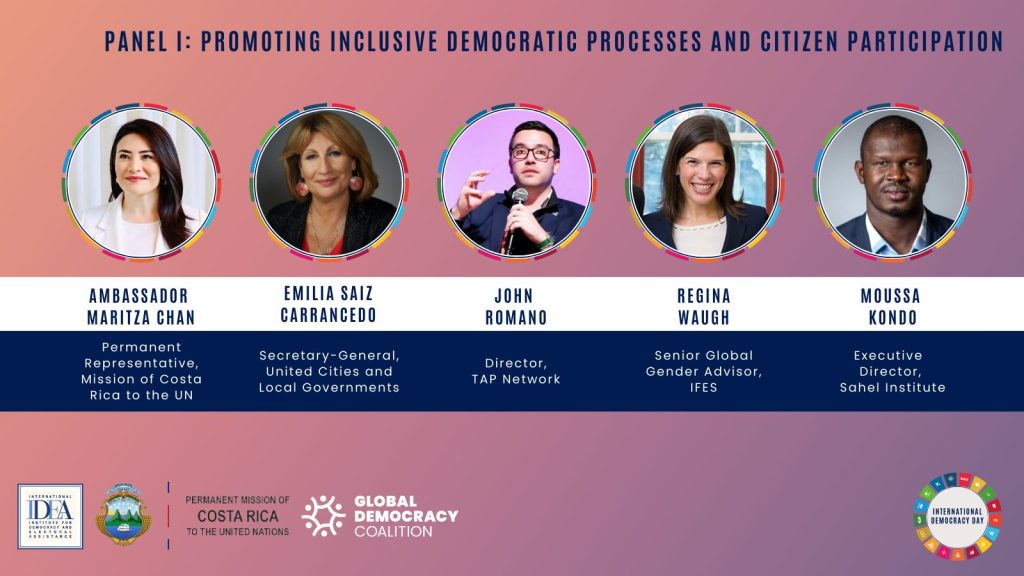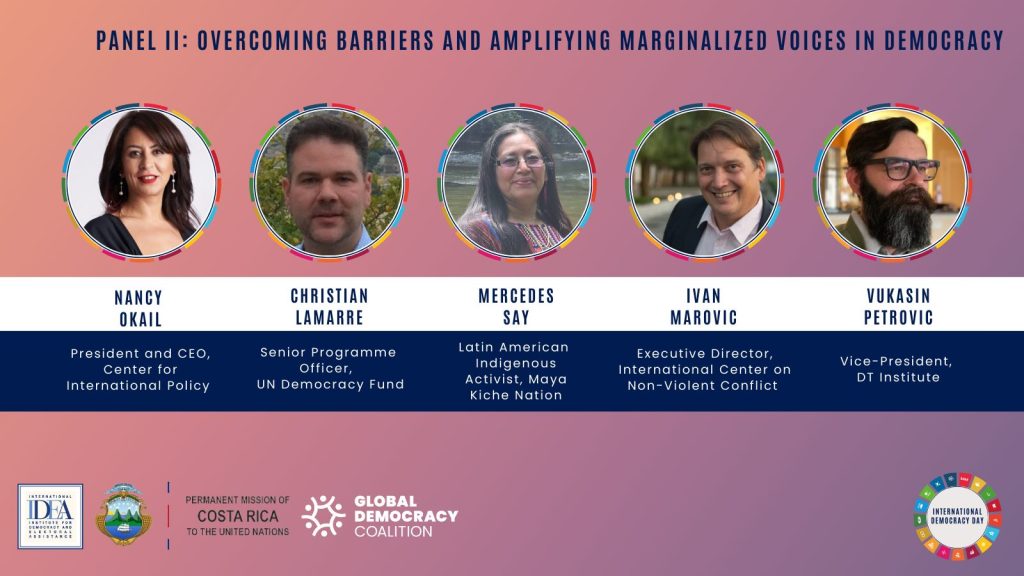International Democracy Day 2023 – Inclusive Democracy for Sustainable Development: Challenging Norms, Empowering Marginalized Communities
International IDEA and the Global Democracy Coalition hosted the International Democracy Day 2023 – Inclusive Democracy for Sustainable Development: Challenging Norms, Empowering Marginalized Communities on 15 September, between 9:30 and 14:00 at the UN Conference Building and streamed live through UN WebTV.
Building upon the spirit of International Democracy Day and considering the inter-linkages between the United Nations and its Member States, civil society, and other stakeholders, this event sought to deepen our understanding of the profound relationship between inclusive democracy, the 2030 Agenda for Sustainable Development, and the forthcoming SDG Summit. This discussion explored the multidimensional nature of these relationships and recognized the pivotal role played by democratic governance, principles, and institutions as powerful drivers in achieving the Sustainable Development Goals (SDG).
Throughout the event, we delved into the intricate interplay between the role of the United Nations, inclusive democracy, social contracts, and the active participation of marginalized communities in democratic processes, all of which contributed to sustainable development. We recognized that social norms and contracts played a crucial role in shaping the opportunities and barriers faced by marginalized groups, influencing their engagement and contributions to democratic decision-making and the overall development agenda.

Panel 1: Promoting Inclusive Democratic Processes and Citizen Participation for Peaceful and Just Societies (10:15 – 11:30)
The panel explored the challenges faced by marginalized communities in accessing and participating in democratic processes, while highlighting strategies that addressed these barriers and fostered inclusive democracy. It examined the importance of gender equality (SDG 5), reduced inequalities (SDG 10), and peace, justice, and strong institutions (SDG 16) in shaping inclusive democratic processes. By examining these goals, the panel aimed to deepen the understanding of how inclusive democracy could contribute to sustainable development and create a more equitable and just society.
Speakers Moussa Kondo, Executive Director, Sahel Institute (Moderator) H.E. Ambassador Maritza Chan, Permanent Representative, Permanent Mission of Costa Rica to the UN John Romano, Director, TAP Network Regina Waugh, Senior Global Gender Advisor, IFES Emilia Saiz Carrancedo, Secretary-General, UCLG

Panel 2: Overcoming Barriers and Amplifying Marginalized Voices in Democracy (11:30-12:45)
In our evolving global landscape, the influence of social norms on both democratic institutions and sustainable advancement remained undeniable. These unwritten societal rules often served as either catalysts or barriers to the aims of key Sustainable Development Goals (SDGs). A closer look at these norms, especially in the context of SDGs like Goal 5 (Gender Equality), Goal 10 (Reduced Inequalities), and Goal 16 (Peace, Justice, and Strong Institutions), was crucial. Through this lens, we could better cultivate a global democracy that was genuinely inclusive and set the stage for enduring growth. This panel aimed to spotlight these norms, challenge their continued relevance, and strive for a future where every voice resonated, and every community thrived. The panel was introduced by Pia Wanek, CEO at DT Institute.
Speakers Vukasin Petrovic, Vice-President, DT Institute (Moderator) Nancy Okail, President and CEO, Center for International Policy Ivan Marovic, Executive Director, International Center on Non-Violent Conflict Christian Lamarre, Senior Programme Officer, United Nations Democracy Fund Mercedes Say, Latin American Indigenous Activist, Maya K´iche Nation
Lightning Talks
As an integral part of the event, the GDC IDD celebration also featured a series of dynamic and engaging lightning talks that provided valuable insights and innovative approaches on the intersection of inclusive democracy and sustainable development. These concise presentations, which were in video format, offered an opportunity to hear from experts, practitioners, and thought leaders who shared their knowledge, experiences, and success stories.
